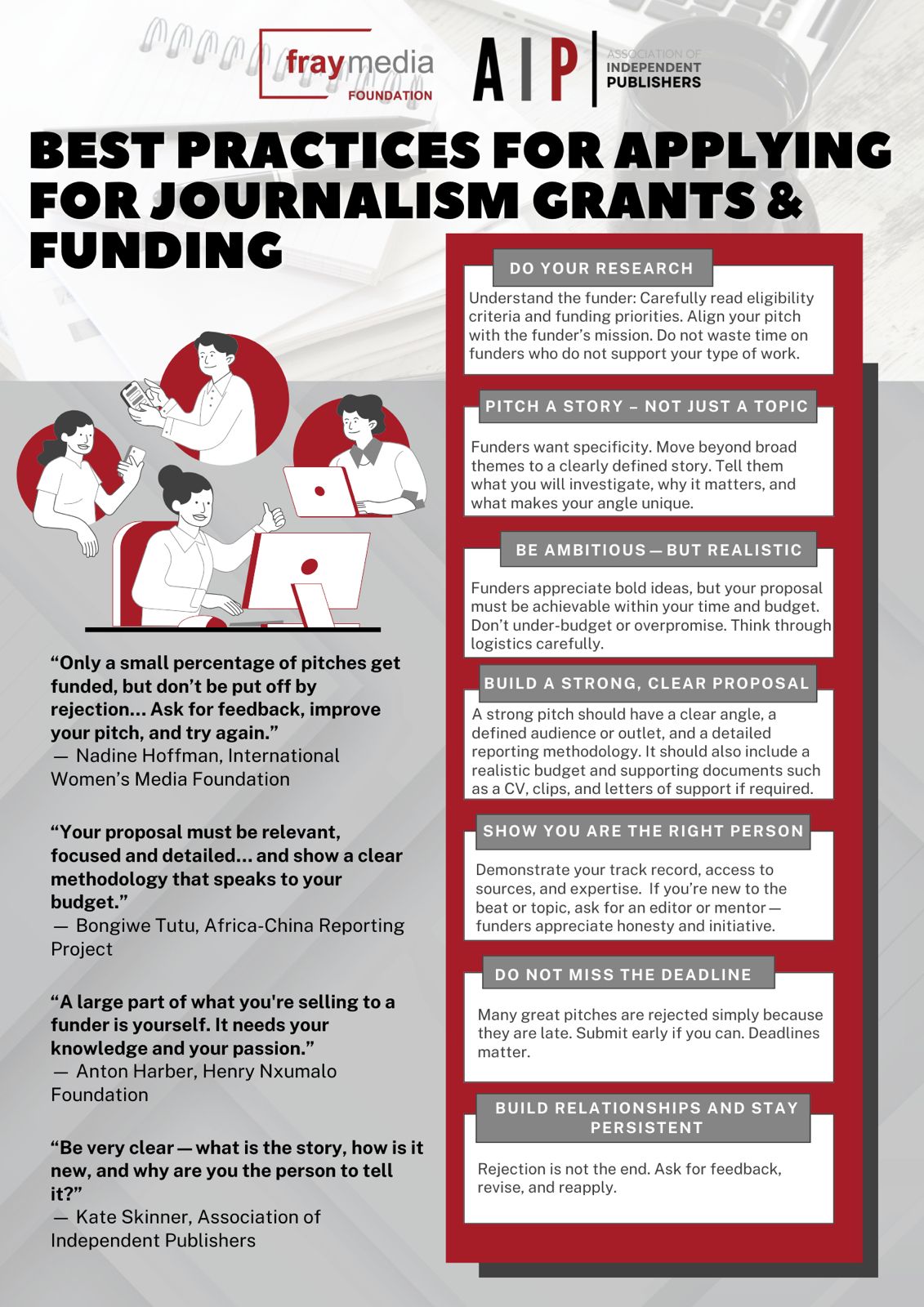In a Shrinking Funding Landscape, Journalists Seek Grant-Writing Strategies
With journalism funding in sharp decline and competition for grants growing fiercer, more than 100 journalists from across Africa joined a webinar on March 26, 2025, to gain practical advice on how to navigate the increasingly difficult funding landscape and secure support for their work. Hosted by the Fraymedia Foundation in partnership with the Association of Independent Publishers (AIP), the session brought together seasoned professionals to share insights from both sides of the funding table. The webinar, moderated by the AIP’s executive director Kate Skinner, aimed to equip small media outlets and independent journalists with tools to pitch successfully for local and international funding, including investigative and storytelling grants.
Navigating a Tough International Landscape
Nadine Hoffman, Deputy Executive Director of the International Women’s Media Foundation (IWMF), opened the session by acknowledging the precarious state of international funding, particularly due to recent political changes in the United States.
“The funding landscape is extremely precarious right now,” said Hoffman. “US government funding cuts have triggered a cascade effect, placing journalism philanthropy under stress as major international funders now receive an overwhelming number of requests.”
Despite the challenges, she encouraged journalists to stay persistent. “Only a small percentage of pitches get funded, but don’t be put off by rejection,” Hoffman urged. “Ask for feedback, improve your pitch, and try again.”
She advised journalists to pitch stories, not just broad topics, and to “be ambitious but realistic.” Applications should demonstrate a clear audience, include letters of support where possible, and feature detailed, feasible budgets. “If your idea isn’t clear in the first few paragraphs, we won’t dig for it,” she cautioned.
Standing Out in the Crowd
Bongiwe Tutu, Project Coordinator at the Africa-China Reporting Project, emphasised the need for clarity and relevance in proposals, particularly for storytelling grants. She shared lessons drawn from years of supporting journalists across the continent.
“Your proposal must be relevant, focused, and detailed,” Tutu said. “Tell us the story you want to investigate, not just the issue. We want to see your methodology, understand your access to sources, and know whether your investigation is doable.”
Tutu highlighted common pitfalls such as vague proposals, missed deadlines, and a lack of contextual research. “Even if a topic seems obvious, don’t assume the reviewers know it. Provide references and demonstrate that you’ve done your homework,” she advised.
Think Like a Funder
Veteran journalist and Henry Nxumalo Foundation director Anton Harber offered advice from both the perspective of a long-time applicant and a current funder. He urged journalists to treat applications like reporting assignments.
“You must research the funder thoroughly—what they fund, what they don’t, and how you fit into that,” Harber said. “We often get applications that haven’t been properly prepared. That lack of prep is an immediate red flag.”
He underscored the importance of specificity, feasibility, and originality. “If your proposal is vague—‘I want to investigate rumours of trafficking’—you’re not ready. Show us what you already know, who you’ll talk to, and why it matters.”
Harber also encouraged applicants to be honest about their skills and open to support. “If this is your first major story and you need an editor or mentor, say so. We’d rather fund a project with the right support than reject someone for lack of experience.”
Exploring Corporate Partnerships
The discussion also touched on corporate funding, an area many small outlets are beginning to explore. Harber noted that corporations are often cautious about journalism but may support aligned initiatives through their corporate social investment (CSI)
programmes.
“You need to understand what a company’s philanthropic interests are—whether it’s education, arts, or youth empowerment,” Harber explained. “They are brand-conscious and may shy away from sensitive reporting, but through intermediaries like foundations, that support can be structured with journalistic independence intact.”
Practical, Ongoing Support from the Fraymedia Foundation
The webinar is part of the Fraymedia Foundation’s growing suite of capacity-building initiatives, which includes a mentorship programme, monthly networking breakfasts, entrepreneurship training, and quarterly training sessions like this one.
“We’re committed to supporting independent journalism in every form and creating a community where women in media can thrive, lead and shape the industry,” said Fraymedia Foundation director Paula Fray, who organised the session. “Today’s turnout proves that the appetite for practical, peer-driven learning is stronger than ever.”

Partner websites:
Association of Independent Publishers: https://aip.org.za/
International Women’s Media Foundation: https://www.iwmf.org/
Henry Nxumalo Foundation: https://henrynxumalofoundation.co.za/
Africa China Reporting Project: https://africachinareporting.com/
YOUTUBE VIDEO: Listen to the webinar here
